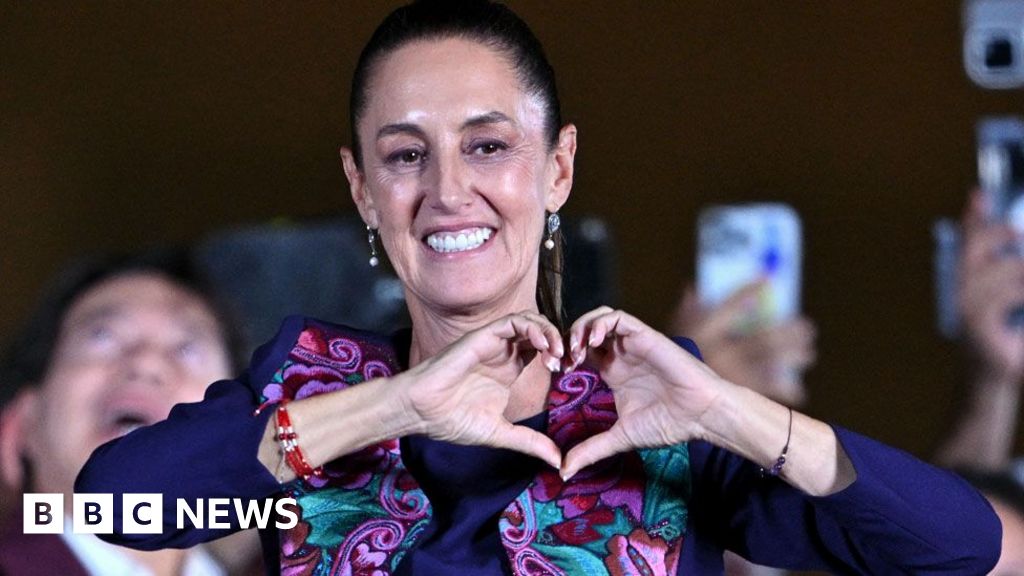Claudia Sheinbaum has been elected as Mexico’s first woman president. The 61-year-old former mayor of Mexico City secured between 58% and 60% of the vote, according to preliminary results from Mexico’s official electoral authority, INE. Her victory margin stands at about 30 percentage points over her closest rival, businesswoman Xóchitl Gálvez.

Also Read: Iceland Elects Businesswoman Halla Tómasdóttir as New President
Ms. Sheinbaum, who will assume office on October 1, 2024 will succeed her mentor, outgoing President Andrés Manuel López Obrador. She has promised to continue the policies of López Obrador, focusing on building upon the welfare programs that have increased his popularity.
In her victory speech, Claudia Sheinbaum addressed the nature of her win, stating, “For the first time in the 200 years of the [Mexican] Republic, I will become the first woman president of Mexico.”
Thousands of flag-waving supporters gathered in Mexico City’s main square celebrating Claudia Sheinbaum’s victory.
The celebrations included singing, dancing to mariachi music and a heartfelt victory speech from Sheinbaum, who thanked millions of Mexicans for their support. “I won’t fail you,” Claudia Sheinbaum vowed to the cheering crowd.
Claudia Sheinbaum’s main opposition rival, Xochitl Galvez of the conservative PAN party conceded defeat. Galvez had secured approximately 30 percent of the votes. The only male candidate, Jorge Alvarez Maynez representing the centrist Citizens’ Movement gained only about 10 percent of the vote.
The election saw a high voter turnout with nearly 100 million people registered to vote in the world’s most populous Spanish-speaking country, home to 129 million people.
The election of Mexico’s first female president was celebrated as a step forward in a country where gender-based violence remains a critical issue.
Clemencia Hernandez, a 55-year-old cleaner in Mexico City expressed hope that Sheinbaum’s presidency would bring about change for women, many of whom face domestic abuse and employment restrictions.
Daniela Perez, a 30-year-old logistics company manager with similar sentiments, highlighting the nature of Sheinbaum’s win and the expectations for improvements in women’s rights and efforts to combat femicides.
Claudia Sheinbaum’s popularity is partly attributed to the endorsement of outgoing President Andres Manuel Lopez Obrador, a fellow leftist and mentor with an approval rating exceeding 60 percent.
Lopez Obrador, who is limited to a single term congratulated Claudia Sheinbaum with “all my affection and respect.”
The electoral process was by violence, with over two dozen aspiring local politicians murdered. Thousands of troops were deployed to ensure voter safety including the murder of a local candidate hours before the polls opened.
In Puebla, two people were killed when armed assailants attacked polling stations to steal papers. Voting was also suspended in two municipalities in Chiapas due to violence.
Claudia Sheinbaum has pledged to continue Lopez Obrador’s “hugs not bullets” strategy focusing on addressing the root causes of crime rather than solely relying on military force.
Her main opponent, Galvez, advocated for a tougher stance on cartel-related violence asserting that “hugs for criminals are over.”
Also Read: Donald Trump Found Guilty on All Counts in Hush Money Trial
The next president faces the task of managing relations with the United States particularly concerning cross-border drug smuggling and migration issues.
More than 450,000 people have been murdered and tens of thousands have gone missing since the government began deploying the army to combat drug trafficking in 2006.
This election was the largest in Mexico’s history, with more than 20,000 positions up for grabs including members of Congress, several state governors, and myriad local officials.
The National Electoral Institute reported having to cancel plans for 170 polling booths due to security concerns mostly in Michoacan and Chiapas. Nearly 100 million Mexicans were eligible to vote including around 1.4 million eligible to vote abroad.
Some voters participated in the “Vote for the Disappeared” campaign, nullifying their votes by writing in the names of some of the country’s over 110,000 missing people as a form of protest against the government’s handling of the crisis.
The election campaign was by violent attacks with more than 20 local candidates killed, although other sources suggest the number could be as high as 37.
Born to Jewish immigrant grandparents from Bulgaria and Lithuania, she brings a background to the presidency.
Before entering politics she had a career as a scientist, specializing in energy engineering and climate change.
Claudia Sheinbaum has a degree in physics and a doctorate in energy engineering. Her academic achievements include contributions to the Intergovernmental Panel on Climate Change (IPCC), which won the Nobel Peace Prize in 2007.
Her political career began in earnest when she was appointed Secretary of the Environment for Mexico City by then-Mayor Andrés Manuel López Obrador.
She later became the first female mayor of Mexico City in 2018, a role she held until 2023. Her tenure as mayor is credited with various improvements in security and public welfare.
Claudia Sheinbaum’s campaign benefited from the endorsement of López Obrador, whose approval rating is close to 60%.
Her association with the ruling Morena party, which is seen as the party of the poor and disadvantaged, helped her secure a huge portion of the vote.
Also Read: Georgia Parliament Overrides Presidential Veto of Foreign Agent Bill





















